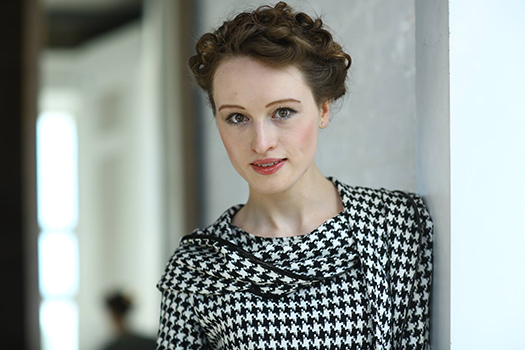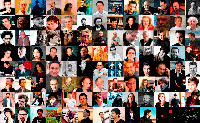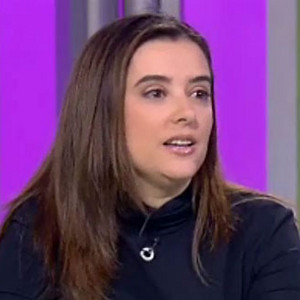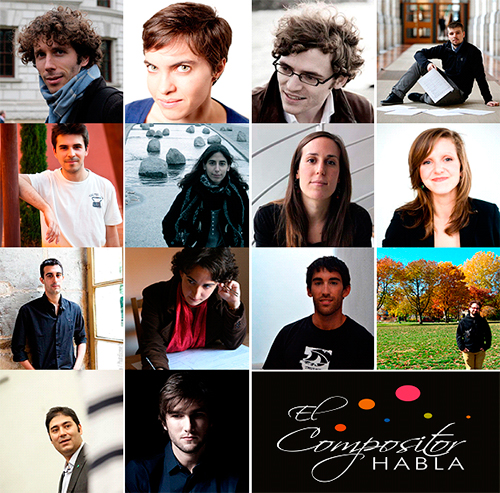Artistas
Elena Rykova (Compositora)
Elena Rykova | Entrevista con Elena Rykova
13/01/2016Entrevista. Acaba de ganar el Premio Federico Mompou y se perfila como una de las compositoras jóvenes más interesantes de su generación. Sin duda habrá que seguirla.
"I would place the reason of winning the time as the main value of the prize. "
 1. Ruth Prieto: You have just won the Federico Mompou Award for composition 2015: what does this award mean to you?
1. Ruth Prieto: You have just won the Federico Mompou Award for composition 2015: what does this award mean to you?Elena Rykova: I feel very honored to win the Federico Mompou Award, I am very happy. Obviously by winning a competition with a prize, you first of all win the time to occupy yourself totally with composition without thinking at least for several months about a vital issue, how to earn for a living. The time is the most precious resource, especially nowadays, when it is not easy to live just with contemporary composition, particularly for young composers and students. And I am very much delighted with the fact that my piece will be obligatory in the Saxo festival in Andorra. I already had a similar experience with a solo clarinet piece played by variety of interesting musicians; the diversity of interpretations grants a composer with an exclusive experience elucidating sometimes rather unexpected facets of the piece.
2. R.P.: How important are awards for composers?
Elena Rykova: Well, I would place the reason of winning the time as the main value of the prize. Most part of competitions has its own format, so a lot of music, especially interesting and extraordinary, doesn’t have the chance to fit it. That is why it is important to consider any competition or call-for-scores or whatever else just one more try for a lottery, nothing else. Sometimes, if you have a feedback from a jury, you can surprisingly gain a great experience, precious advice or a new point of view on your work, but that happens really rarely. Almost no one wants to spend the time to write a few lines after reading hundreds of scores of applicants, and I can understand it. So often composers just stop to send their works after a couple of “non-successful” applications submitted.
Another point is the motivation. A rewarded effort is the method that we are grown up with from the very childhood.
"The motivation is significant and especially efficient when it arrives in the form of international acknowledgement, but it is also important to remember that it is not an absolute determinant for the professional career."
3. R.P.: Tell us about the piece that won the award.
Elena Rykova: Actually, Federico Mompou Award occurred to be for me a very important experience and a perfect example of not giving up. “Brain-ring”, my piece for saxophone quartet, first appeared in the spring of 2013 as a quartet of clarinets. It was just a first sketch of the piece, which was never played or tried out anywhere. In fact it was “in the box” until I saw an interesting competition in Europe for saxophone quartets, for which I first did a sax version. This time the piece changed its face even more. I didn’t win that contest, but I luckily got an incredible feedback from one of the members of jury, with whom I never met and who didn’t know me before. He told me, that I was very near to win the prize and that my work was discussed for a long time; he pointed out the places, which could be even stronger in a way it was notated, for example. He even sent some examples of possible solutions! I was so touched by the fact that a famous composer dedicated his time to write to a young person who he even didn’t know at all! Several months after I saw the guidelines of Federico Mompou Award and I realized that this time it could be a chance for me. So the final version of the piece I’ve done according to those precious advices and eventually I got the award. Who knows, maybe if I didn’t receive that feedback then, I would not get it. This is again about the issue, how it is important sometimes to write at least a few lines to the applicants, for them to have an experience from a contest and not just sending the scores into the black hole.
If to speak about the musical side, this piece is quite different from my other works, since it has its own history, but still there are some important points, on which I am working on now. For instance, the very beginning of my exploration of the signal system is already present there. In my last pieces I elaborated it much more, but the concept is the same: to go beyond the traditional rhythm organization by increasing the mutual dependence of the performers. “Brain ring” was the first piece of mine, which has no parts for this particular reason. To a certain degree this idea gives also a space for interpretations of musicians within the system of natural dependences. Under dependences I mean, for example the situation when the impulse of the first performer hangs upon the short gesture of the second one, who is dependent on the end of the phrase of the third musician, who finishes it as soon as the breath in his lungs is out etc. In my new pieces I extrapolate this system on rather big ensembles, to make it function like a big organism without a conductor. And if to analyze closer, almost each chain of gestures between the performers finally comes to the dependence on the category that lies beyond, for instance on the diapason of the instrument, the length of a certain surface, the quality and the length of the particular piano strings due to its brand and so on.
"I am really fond of this matter; it is like in a real life, concatenation of circumstances: it is possible to follow the links of the chain only until a certain point, further is beyond the human comprehension."
4. R.P.: What are you working on at the moment? Where are you right now as a composer?
Elena Rykova: I am currently exploring my “found world” with the aim of understanding it more and more. I finally start to feel the inner harmony in its presence, for which I was searching during the last several years. We never know when comes the time to understand certain things, we just discover them and after some time we understand why we discovered it now and not before. It is all the time like that, we find something, which seems to be so huge and after a while we realize that it is just a little part of a whole galaxy, which is also a part of an endless universe. And I believe that a composer is like a voyager with a mission to discover a certain land discovers another one. That is how I believe we get the map of our worlds, and it is always with a current status “to be completed” but something tells me that it could never be. Sometimes we can be lost or afraid of something, another time we find ourselves on a desert island, because a found world, where a composer lives, is also versatile, like we are, like our real world is. It would be weird and even more dangerous to find yourself always in a comfortable place without any motivation to the new expeditions.
"I strongly believe, that music needs an adventure, which is impossible to fulfill without taking risks."
5. R.P.: How is your creative process?
Elena Rykova: It is absolutely unpredictable. I don’t have an established order for composing or finding the ideas. What I do, I am listening to the surrounding world, to any objects and things I see or hear wherever I am and if they are “saying” something to me, I follow them, like Carroll’s Alice. I can find myself at the construction market or listening to a string trio in a beautiful concert hall and suddenly realize that at this very moment I am thinking about a constitution of a respirator or the meaning of a big silent tam-tam on the background of the stage in the context of a string trio. Found objects and instruments are absolutely equal in my imagination. In a way, if I use an instrument in a piece, it occurs to be a “found instrument”. And I am fond of experimenting how they all could communicate with each other on the crossroads of different contexts and what the performer turns to be in this situation.
"Each thing in the world is a symbolical for me and in this way I am a spiritual composer, because I invoke the very essence of any object in order to communicate with it, to feel what it wants to bring to the piece, and finally what the piece itself wants to be."
6. R.P.: What are your next projects?
Elena Rykova: For 2016 I got three commissions: for MCME and UMS’n JIP ensembles with concerts in Russia and Switzerland, for New Talents Biennale in Cologne with ensemble Handwerk and for ReMusik festival in Saint-Petersburg. The New Year promises to be quite intense and challenging. And I am pretty much looking forward to it!
Las fotos de Elena Rykova son de Nikolay Kritsky y han sido facilitadas por la compositora.
Más informaciónen el perfil de la compositor en nuestra web: Elena Rykova
Elena Rykova: For 2016 I got three commissions: for MCME and UMS’n JIP ensembles with concerts in Russia and Switzerland, for New Talents Biennale in Cologne with ensemble Handwerk and for ReMusik festival in Saint-Petersburg. The New Year promises to be quite intense and challenging. And I am pretty much looking forward to it!
Las fotos de Elena Rykova son de Nikolay Kritsky y han sido facilitadas por la compositora.
Más informaciónen el perfil de la compositor en nuestra web: Elena Rykova
Destacamos ...
Nueva Sección Directorio
dedicada a la promoción de compositores, intérpretes, instituciones y editoriales.

dedicada a la promoción de compositores, intérpretes, instituciones y editoriales.



